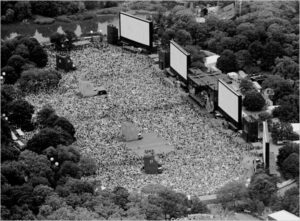In my past and present, I write mostly serious short pieces on speculative fiction for Aurealis, one of my favourite magazines. In 2016 I wrote one slightly-less-serious-than-usual article. This year I have an article that mentions Norman Lindsay in another edition of Aurealis, but it is about one of his most hated rivals.
Early Australian Fantasy: The Magic Pudding by Norman Lindsay
The writing world is full of solid literary criticism. Sometimes, it’s important to see literature from a different perspective.
We bring ourselves to our reading. We bring our dreams about stories and we bring the other stories we’ve read and we bring our expectations. Readers aren’t neutral, so I thought I’d explore how this non-neutral reader sees a particular work. The work in question is Norman Lindsay’s The Magic Pudding. It’s so very Australian, with its larrikin humour and its reliance on British culture and its very Australian animals. It’s one of the great works of Australian fantasy. It’s been written about by so many scholars and studied in all its nuances. Just not the way I will look at it here.
Today I’ll examine The Magic Pudding from three angles. The first is nostalgic. I used to actively look for pudding recipes when I was a child, almost entirely due to this book. Recipes sum up nostalgia in this case more effectively than an analysis of my feelings. The second angle is that the structure of the book is very much derivative of Gilbert and Sullivan. The third is how I read it as a fantasy novel.
Let us look at Gilbert and Sullivan first.
The Magic Pudding would work well with music. The characters sing so very much and we’re given many of their verses. We’re not given the whole of any of the very long songs, which is probably just as well given that the long songs would add another three hundred pages to the story, but the whole novel is riddled with rhyme and song.
The songs fit into the tale in the same way they do in light opera in general. They reflect the characters and they denote a pause in the action and they change the direction of the story and they… do virtually anything. Not all of what they do makes sense logically or in narrative terms, which is why I see The Magic Pudding as a comic operetta, in the style of Gilbert and Sullivan. The world of Bunyip Bluegum is a nonsensical world, where right and wrong and logic do not have standard values, and it’s rather like the world of The Mikado in how one thing leads to another by verbal trick.
The logic uses Australian culture, of course, to underpin its deviance from rational narrative. Two of the heroes are murderers and thieves, for they killed the cook who invented Albert the Puddin’ (we know this because Albert says so) and yet they feel noble and hard-done by when the puddin’ thieves try to steal from them. And the capacity to sing a song and eat a good meal count for more than prior social standing. The world is not an Alternate Earth—it’s the world of a stage. The world of an Australian stage.
So why do I also read this book as a fantasy narrative? Lindsay borrows from the late nineteenth century fantasy writers as much as he borrows from light operetta. It’s the combination of the two that give the book its uniqueness.
The Magic Pudding has some of the critical elements of a fantasy narrative, despite seldom being listed as such. My inner fantasy fan has always read it as a fantasy novel (with rhyme, illustrated), since I was old enough to read. It was on the family bookshelves from then until now, for I have just inherited the family copy. I’m working from the 1958 re-issue of the 1908 original, for those who really need to know these things. (I should have said this right up front, but one thing that re-reading The Magic Pudding does, every time, is lead to a disordered mind.)
When I started this essay, I was going to say that The Magic Pudding is a quest fantasy, but now I’m not sure if it’s that or sword and sorcery, with Albert the Puddin’ taking the role of the sapient and rather unlikeable artefact. Not only is my mind disordered, but it’s also indecisive. Let’s take a look at some of the fantasy elements in the book instead of coming to a firm decision about the book’s inner identity.
There are five critical elements: the hero’s journey, the artefact of power, the stereotyping of minor players, fabulous backstory, a happy ending.
The Hero’s Journey
Bunyip Bluegum starts off as an oppressed near-adult. The source of his oppression is his uncle’s whiskers:
Whiskers alone are bad enough
Attached to faces course and rough,
But how much greater their offence is
When stuck on Uncles’ countenances.
His uncle, being of unkind disposition, refuses to denude himself of them, despite the lack of room for the whiskers in the family home. At first, Bunyip Bluegum eats his soup outside (for drinking whiskers in his soup is intolerable) but finally he is forced to leave home. He takes up a walking stick (for he lacks any possessions and so can’t be a swaggie or other traveller) and becomes a gentleman of leisure. This is not only his first step into adventure, but it demonstrates that he will grow in status as he travels. Like so many young men of good family, the Outback and a walking stick lead to a new and better existence. And so he does. Each slice of the story shows that Bluegum is the centre of the adventures and is the one who, with increasing wit and decreasing morality, helps his friends rescue the pudding and escape from danger.
Precious artefact
Albert the Puddin’ is magic and coveted. His first manifestation was ’in a phantom pot/A big plum-duff an’ a rumpsteak hot‘ on an iceberg. Men and penguins will kill to obtain him and will commit trickery and deceit. While his special property is the unlimited capacity to feed people pudding and while that pudding can be any type (though is most likely to be rump steak, steak and kidney or plum duff) in terms of the fantasy quest it’s his personality that counts.
A sapient quest object has to be either wise or very difficult and Albert is as difficult as a badly brought up eight year old with a talent for rude barbs. When I was eight, I have to admit, I was very relieved to read the episode where he was turned upside down and sat upon, for there is some magic that is better silenced. Still, there is no denying that Albert is a precious object without equal. He belongs in a quest novel. Characters spend their lives defending him, chasing him, questing for him, and eating him.
Stereotyped Minor Characters
The Magic Pudding is a picaresque adventure and one of the most important elements in picaresque adventures is the secondary cast. It has to include scurrilous rogues (in this case, the puddin’ thieves), women who form an attractive background (and even, in the case of The Magic Pudding are rescued from drowning and given a fictional love for a penguin as part of said penguin’s song—I was going to quote from it here, but the best bit is a spoiler and, if we’re talking fantasy, we have to avoid spoilers) but have no personality or role of their own. Minor characters also include, of course, any number of random people and bandicoots for when a character needs direction or assistance. The only thing I’m unsure about in this is whether there are enough bandicoots in classic picaresque fantasy, but that’s another subject and needs to be left for another day.
Backstory
Heroes don’t have much backstory (just uncles with whiskers). Most of them emerge from voids with little experience or personality. They grow into both experience and personality through their adventures and with the help of their sidekicks. These personality-filled support characters have backstory in spades. This backstory serves to set up events, give stories to pass the time, and makes characters more personable when they lack the intrinsic interest of the Hero.
The fact that Sam Sawnoff and Bill Barnacle are prone to singing their background stories merely emphasises the colour they bring to the story. We hear about their adventures on the ice (the prettified version) and romance (the prettified version) and pretty much everything about them that Lindsay can fit into verse.
It’s important to note here that Lindsay came of the same literary generation as AB Patterson and Henry Lawson and knew them both, though he didn’t really know Patterson that well and couldn’t get past Lawson’s deafness. The rhymes are part of the vernacular of the day. This is the backstory of The Magic Pudding, however, and not of her characters, so I won’t explore it further here.
Happy ending
Where a young boy is forced to leave home due to the dreadful torment of his uncle’s whiskers, the best possible happy ending is for him to make his own home. In this case it is a home with a special pudding paddock on a branch just high enough to enable a certain Puddin’ to pull faces at pickle onions.
Like all great fantasy novels, The Magic Pudding anticipated the needs of fans in some very interesting ways. Fans can filk the songs, or cosplay the characters, for instance. Given I belong to foodie fandom, I, of course, want to find out what Albert the Puddin’ tastes like.
Assuming that making a sentient pudding is not wise, since it inevitably leads to the death of the creator, all the different flavours of Albert reflect standard recipes of the time. My source is the first cookbook printed in Australia (to the best of our knowledge) and there are three reasons for taking the recipe from it. First, I’m not breaching any copyright. Second, it’s the exact right age to reflect Norman Lindsay’s mother’s generation and the pudding she would have cooked (although there is a greater likelihood of her owning a copy of Mrs Beeton than this volume), which means it’s very likely to be the flavours Lindsay knew, and third, the book is suspect (at least some of it was plagiarised from earlier cookbooks) which exactly fits the scurrilous humour of The Magic Pudding. Just because a piece of writing is in our past, doesn’t make it respectable. Just because The Magic Pudding is witty and wonderful, doesn’t make it respectable, either. So, from Edward Abbott’s infamous cookbook English and Australian cookery book: cookery for the many, as well as for the upper ten thousand (the Pudding section, of course) here is a taste of Albert.
Beef-steak Pudding.—Take two pounds of rump-steak, and cut into seasonable pieces; and cut into shreds two or three onions. Paste the pudding-basin with good crust, not too rich nor too poor. Put the meat into the basin, with some pepper and salt, and a dozen oysters, with a little thickening, composed of mushroom ketchup, flour and water, and mustard. Simmer for an hour and a half, and serve in the basin; or turn it out, if the gravy in the pudding can he retained.
Connoisseurs prefer a beef-steak pudding to a beef-steak pie; and mutton, veal and ham, kidney, sausage, fowl, fish, and game puddings may be served in a similar way.






